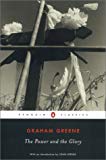
The Power and the Glory is a novel by Graham Greene about a "whisky priest" traveling in Mexico, where he finds himself unable to repent for his past unholy behavior. Eventually the priest is chased by a lieutenant who takes and kills hostages and who believes Catholicism to be corrupt. Eventually the priest knowingly falls into a trap of the lieutenant, who pities him and allows the priest to take a man's confession.
The main character is an unnamed 'whisky priest', who combines a great power for self-destruction with pitiful cravenness, an almost painful penitence, and a desperate quest for dignity. By the end, though, the priest "acquires a real holiness." The other principal character is a police lieutenant tasked with hunting down this priest. This Lieutenant– also unnamed but thought to be based upon Tomás Garrido Canabal – is a committed socialist who despises the Church.
The story starts with the arrival of the priest in a country town in an area where Catholicism is outlawed, and then follows him on his trip through Mexico, where he tries to minister to the people as best as he can. He is also haunted by his personal demons, especially by the fact that he fathered a child in his parish some years before. He meets the child, but is unable to feel repentant about what happened. Rather, he feels a deep love for the evil-looking and awkward little girl and decides to do everything in his power to save her from damnation. The priest's opposite player among the clericals is Padre José, a priest who has been forced by the government to renounce his faith and marry a woman and lives as a state pensioner.
During his journey the priest also encounters a mestizo who later reveals himself to be a Judas figure. The lieutenant, on the other hand, is morally irreproachable, yet cold and inhumane. While he is supposedly "living for the people", he puts into practice a diabolic plan of taking hostages from villages and shooting them, if it proves that the priest has sojourned in a village but is not denounced. The lieutenant has also had bad experiences with the church in his youth, and as a result there is a personal element in his search for the whisky priest. The lieutenant thinks that all members of the clergy are fundamentally evil, and believes that the church is corrupt, and does nothing but provide delusion to the people.
In his flight from the lieutenant and his posse, the priest escapes into a neighbouring province, only to re-connect with the mestizo, who persuades the priest to return to hear the confession of a dying man. Though the priest suspects that it is a trap, he feels compelled to fulfil his priestly duty. Although he finds the dying man, it is a trap and the lieutenant captures the priest. The lieutenant admits he has nothing against the priest as a man, but he must be shot "as a danger". On the eve of the execution, the lieutenant shows mercy and attempts to enlist Padre José to hear the condemned man's confession, but the effort is thwarted by Padre José's wife. The lieutenant is convinced that he has "cleared the province of priests". In the final scene, however, another priest arrives in the town – which, among other possible readings, suggests that the CatholicChurch cannot be destroyed.
Already have an account? Log In Now